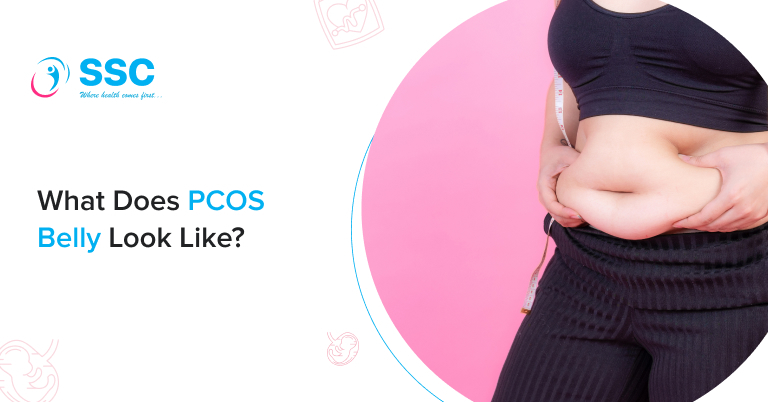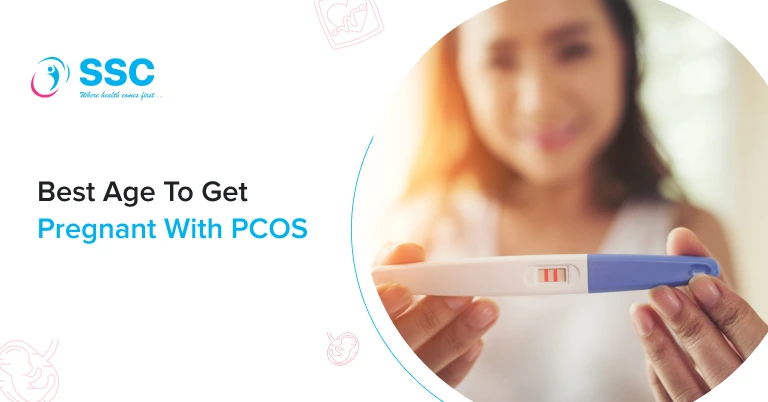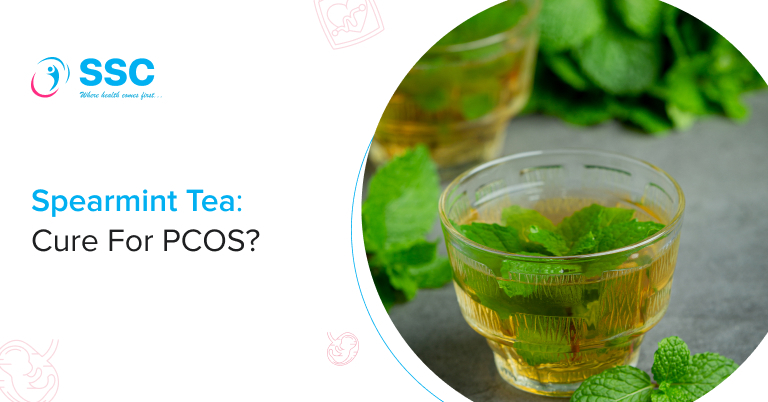What Does PCOS Belly Look Like?
Key Facts
- PCOS belly occurs when excess fat or weight builds up around the abdomen, often due to hormonal imbalances and insulin resistance caused by PCOS.
- An apple-shaped appearance and significant fat buildup around the waist are common signs of a PCOS belly.
- An apple-shaped figure is often a result of a higher waist-to-hip ratio caused by PCOS.
- Hormonal imbalances, insulin resistance, slow metabolism, family history, and inflammation can all contribute to the development of a PCOS belly.
- With PCOS, your belly may look bigger or rounder, especially if your waist is over 35 inches, and it may feel firm even if the rest of your body stays the same.
Women who have PCOS (Polycystic Ovary Syndrome) frequently accumulate extra fat around their abdomen, which results in an apple-shaped figure and a larger waist-to-hip ratio, which is known as PCOS Belly.
Although it doesn’t happen to everyone with PCOS, being overweight increases your risk of developing a PCOS belly. This guide will outline the symptoms, causes, and how to manage a PCOS belly.

It should come as no surprise that PCOS can affect the way our stomachs feel and seem, as it affects the ovaries and reproductive systems. The NHS reports that 1 in 10 women suffers from polycystic ovarian syndrome, or PCOS.
What is PCOS?
A hormonal condition known as polycystic ovarian syndrome (PCOS) affects women who are of reproductive age. It is characterized by several symptoms, including irregular periods, increased levels of androgens (male hormones), and the development of cysts on the ovaries.
The most common PCOS symptoms are
- Irregular periods
- Unwanted Hair Growth (Hirsutism)
- Acne or Oily Skin
- Hair Loss
- Weight Gain
- Insulin Resistance
- Mood Swings
- Reduced Fertility
- Obesity
A Human Reproductive Update journal study found that ‘PCOS belly’ affects 20–86% of women with PCOS. Approximately 20% of people with PCOS develop a PCOS belly. PCOS is the most prevalent endocrine condition that affects people with ovaries.
What Does PCOS Belly Look Like?
An apple-shaped appearance and a significant buildup of fat around the midsection of the waist are common characteristics of a PCOS belly. Depending on your genes and other conditions, your PCOS belly may look small, round, and bloated.
This happens due to accumulated excess visceral fat in the lower belly, which frequently feels hard to the touch. An apple-shaped figure is often the result of a high waist-to-hip ratio (higher than 0.87) caused by a PCOS belly.
Studies indicate that people with PCOS have a more excellent distribution of body fat around their belly than in other areas. In addition to increasing the risk of conditions including insulin resistance, type 2 diabetes, and heart disease, a PCOS belly can result in mental stress and physical discomfort.

How can you tell if you have a PCOS Belly?
The following are the signs that indicate you have PCOS belly:
High Waist-to-Hip Ratio: If you have PCOS, your waist-to-hip ratio may be greater than 0.87, and your waist may measure 35 inches (89cm), giving you an apple-shaped belly.
Abdominal Weight Gain: Even if the rest of your body remains the same size, your belly may appear larger or more bloated if you have PCOS. This is frequently one of the most noticeable signs.
Firm to the Touch: Your PCOS belly may feel hard due to excess fat in the lower stomach region.
No Changes Seen in the Stomach: For some people, the size or shape of their stomachs may not change.
What Causes PCOS Belly?

According to research, insulin resistance or hormonal imbalances may cause PCOS belly. Increased insulin levels due to insulin resistance cause the ovaries to create more androgens, such as testosterone.
Because of these hormones, fat accumulates, particularly around the abdomen. This weight gain can increase insulin resistance. Although insulin resistance is prevalent among PCOS-afflicted women, not all of them are affected.
Bloating, weight gain, or both may contribute to PCOS Belly Fat. According to one study, despite having a normal BMI, women with PCOS had increased visceral fat (VAT) and more fat surrounding their organs. Because visceral fat bulges the abdominal wall and is more difficult to shed than subcutaneous fat, it gives the PCOS belly a beer-belly look.
Difference between PCOS Belly and Normal Belly:
| Features | PCOS Belly | Normal Belly |
| Fat Distribution | Fat is typically concentrated in the lower abdomen, leading to a rounded or protruding appearance. | Fat is more evenly distributed across the abdomen. |
| Hardness | Because of visceral fat accumulation, the abdomen frequently feels harder | Normal abdominal fat is typically softer and less hard. |
| Weight Loss | Even with a good diet and regular exercise, losing weight might be difficult. | It can typically be decreased with proper diet and exercise. |
| Causes | Insulin resistance and hormone imbalances are the leading causes. | It is mainly caused by a lack of physical activity and an excessive calorie intake. |
Risks Linked to PCOS Belly and Weight Gain:
- High Blood Pressure: Your heart must work harder to pump blood when you have extra weight around your abdomen.
- Endometrial Cancer: There is a higher chance of endometrial cancer if you have
- PCOS and irregular periods because your body may not eliminate the endometrial lining.
- Infertility and Irregular Periods: Excess fat and high male hormone levels can interfere with egg formation, making pregnancy more difficult.
- High Triglycerides and Cholesterol: Belly fat can boost triglycerides, which, when paired with high cholesterol, increases the risk of heart disease.
- Sleep Apnea: Obstructive sleep apnea can be more likely to result from PCOS-related weight gain and elevated testosterone levels.
- Insulin Resistance: Excess belly fat may make your body more resistant to insulin, resulting in type 2 diabetes.
- Inflammation: Fatigue, depression, and heart health issues can result from inflammation caused by belly fat.
How to get rid of PCOS Belly?
Consult with Doctors:
Speaking with your doctor before beginning a weight loss program is essential. They can help create a customized treatment plan based on your requirements.
Eat Nutritious Food for Weight Loss:
You can control your weight and reduce PCOS symptoms by making small but significant dietary adjustments. According to studies, belly fat can be considerably reduced, and general health can be improved by decreasing just 6–7% of body weight.
You can incorporate the following PCOS-friendly foods into your meals:
- Non-starchy vegetables to add nutrients (restrict starchy ones like potatoes)
- Whole Fruits for natural sweetness and additional fibre
- High-Fiber Whole Grains such as brown rice, pasta, and whole-grain bread;
- Lean Proteins such as turkey, chicken, or unprocessed meats
- Healthy Fats from avocados, nuts, and seeds (consume in moderation)
- Fish for heart-healthy omega-3s
One way to manage a PCOS belly is to avoid foods that can cause weight gain. Limiting high-fat foods like chips, buttery popcorn, and sweets is also advised because they are not very nutritious and can make it more difficult to control your weight.
Related: Can Spearmint Tea Help Treat PCOS? How It Works?
Follow Anti-Inflammatory Diet:
Since inflammation is a significant factor in PCOS, following a diet low in inflammation can help control symptoms.
- Add berries, seeds, and nuts to your meals.
- Include whole grains, fatty salmon, olive or coconut oil, and green leafy vegetables.
- Other foods that can help you feel better include avocados, tomatoes, broccoli, green tea, mushrooms, and even dark chocolate or cocoa.
Follow a Low glycemic index (GI) diet:
A low-GI diet is an excellent choice for managing PCOS since, according to a study from Endocrine Reviews, the condition is frequently associated with increased insulin resistance. No one-size-fits-all strategy exists, but your meals should support weight loss, especially belly fat, manage inflammation, and lower insulin resistance.
Foods to include in a low-GI diet: Whole grains, vegetables, legumes, nuts, seeds, and whole fruits rather than juices, as well as fish and chicken, are foods to include in a low-GI diet.
Foods to avoid in a low-GI diet: white rice, Whole wheat and white bread, Cookies, cakes, and other sweets, breakfast cereals, fruit yogurts, Dates, raisins, cranberries, and other dried fruits, Fries and potatoes, sports drinks, soda, and sweet tea.
Try the DASH Diet:
DASH stands for Dietary Approaches to Stop Hypertension, a diet created to lower blood pressure. According to a study published in Hormone and Metabolic Research, this diet improved insulin resistance and decreased belly fat in women with PCOS.
A PCOS diet would include the following:
- Reduce your intake of sugars and increase your intake of complex carbohydrates.
- Consume foods high in healthy fats, such as nuts, seeds, avocados, and olives.
- Cut dairy products.
- Avoid packaged meals, processed foods, and extra sugars and additives.
- Drink plenty of liquids, such as herbal teas and water.
- Avoid Alcohol Consumption
- Add foods that are fermented and rich in fibre and
- Take less caffeine.
Reduce Stress and Get Sufficient Sleep:
Try yoga, meditation, or everyday activities like walking to help you manage your stress. Moreover, lack of sleep might increase hunger, which encourages overeating.
Studies have shown that adequate sleep helps with fat loss, whereas those who get fewer than five hours are more likely to gain weight. Aim for 6–8 hours of sleep per night to enhance your well-being.
Exercise Regularly:
Being physically active regularly can help manage PCOS. Walking, cycling, and swimming can help your body manage insulin more effectively and reduce belly fat.
To include muscle-strengthening activities, try to get in at least 150 minutes of moderate weekly activity, such as brisk walking. Consult your doctor before beginning any new exercise to ensure it’s right for you.
Bottom Line:
PCOS women often have trouble with belly fat, but they may control their weight and shape their bodies with the proper diet and lifestyle changes. Take one step at a time and contact us, the best gynecologist in Bangalore, to personalize your treatment plan for managing PCOS.
Frequently Asked Questions
What is PCOS Belly?
A PCOS belly happens when fat builds up around the abdomen, leading to a higher waist-to-hip ratio. This usually gives the belly an apple-shaped look instead of a pear-shaped one. Gaining weight, especially in the abdominal area, is one of the most common signs of PCOS.
What is the PCOS belly shape?
Abdominal and waist fat give the PCOS belly form its apple-like appearance.Some women may experience bloating or noticeable belly size changes, while others may not. The PCOS belly would be firm and harder to touch due to visceral fat accumulation.
What is PCOS Stomach?
The term PCOS stomach describes the excess fat or weight gain that can develop around the abdomen as a result of polycystic ovarian syndrome (PCOS). Insulin resistance and hormonal imbalances are frequently the reason of this, which can make weight management more difficult and result in unwanted belly fat.
How to get rid of PCOS belly?
To get rid of PCOS belly, focus on consuming healthy foods by adhering to a low glycemic index (GI) and anti-inflammatory diet. Another option is to try the DASH diet, which promotes better health and weight management. The management of abdominal obesity associated with PCOS also requires regular exercise, stress reduction, and adequate sleep.
How do I know if I have PCOS belly?
A PCOS belly appears as a round, bloated lower stomach due to insulin resistance. It’s hard to lose, often comes with carb cravings, and may cause puffiness.
Is it possible to lose PCOS belly fat?
Yes, with healthy eating, regular exercise, stress management, and good sleep. A low-glycemic diet and strength training can help improve metabolism and reduce belly fat over time.
What are the most common signs of PCOS?
PCOS often causes irregular periods, excess hair growth, acne, hair thinning, and weight gain, especially around the belly. Some women also experience fertility issues and dark skin patches due to insulin resistance. These symptoms result from hormonal imbalances and can vary in severity.










